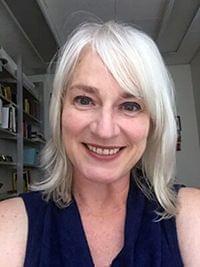Dr. Ann Abbott on why her students should value language diversity - Podcast 4

Dr. Ann Abbott, Director of Undergraduate Studies, Assoc. Professor, Department of Spanish & Portuguese at the University of Illinois.
Nathalie Stein, narrator
Hi, I’m Nathalie Stein. Today we have another in a series of reports by students at Uni High called “Immigration in the Spotlight”. We profile residents of Champaign-Urbana originally from far away places, and the activists who support them. This series is a supplement to our full documentary, Immigrants’ Journeys: Challenges and Opportunities in Champaign-Urbana. See the shownotes for information on how to listen.
Today we hear from Ann Abbott, Director of Undergraduate Studies and an associate professor in department of Spanish, Italian, and Portguese studies at the University of Illinois. Her research focuses on community service learning in tandem with foreign language studies.
As an educator, Abbott is regularly confronted with the reality of studying with Deferred Action for Childhood Arrival status, or DACA. This program is available exclusively to undocumented immigrants who arrived as children. She explains the additional challenges that students with DACA status face:
Ann Abbott
If you have a student who has DACA status, that probably means their parents are undocumented and don’t have DACA, because that’s only for childhood arrivals. President Obama had signed an executive order that was called DAPA, that was supposed to include parents as well. The issue was, it’s wonderful—thank goodness for DACA—but if you give DACA status to a child, they’re part of a family, and when the rest of the family, or other members, some other members of the family, are still very vulnerable because they’re undocumented, then the family can still be torn apart. And, so, that’s what many of your DACA students are facing, that’s a weight that they carry around with them all the time. You know, you can just imagine all of the obstacles and challenges that you have when you’re undocumented. You just carry those around with you.
Nathalie Stein, narrator
Abbott’s role as an educator allowed her to challenge students’ preconceived ideas about immigrants. Among the ideas she sought to confront is that the United States is a monolingual nation:
Ann Abbott
We have, in this country, what is known as a “language ideology” that is about monolingual English. In other words, the way we think about languages in this country, is that, what is normal, quote-unquote normal, what is good, is to speak one language, and that language should be English. But it doesn’t have to be that way, we don’t have to think that way, in other parts of the world, people see languages very differently—there are countries where people are naturally bilingual, or trilingual, or even more, and that those things are seen as good. Not even just good or bad, just that’s the way it is. And so I think that it’s important for us to reflect on that, and to understand that our feelings about English and other languages are not the way things have to be. We are living with an ideology in this country, and that ideology gets promoted, and it gets reinforced, over and over again so that we have come to think of it as—some people will actually say that, the United States, “Well, the official language is English—” there is no official language in the United States, but because we’ve been so conditioned to think of languages in that way, people often assume that, but it’s not true.
Nathalie Stein, narrator
For Abbott, the multitude of languages found across the country bring widespread benefits, rather than drawbacks. In fact, diversity is a critical aspect of what makes the United States unique:
Ann Abbott
What I see happening today is that people—perhaps because that’s their natural inclination sometimes, or because of the way that things are presented in the media—people see immigrants and refugees as something dangerous, as a threat, as people who are competing against us for scarce resources, or “there’s only so much success that can happen in a society, and if they have success, then you’re not going to have success,” I think that that is how a lot of people see refugees and immigrants. However, I just see it as enriching our society, enriching our culture, how beautiful is it to meet people who have different backgrounds than you, who speak different languages than you? For example, when I encounter people who speak a language that I don’t understand, I just want to listen to the sounds of the beautiful language that they are speaking. To me it’s beauty whereas other people perceive these things as dangers, as threats.
Nathalie Stein, Narrator
If you want to listen to the full documentary, learn more about immigration in Champaign-Urbana, and see all the people who made this project possible, go to will.illinois.edu/illinoisyouthmedia.
This has been Immigration in the Spotlight. Thanks for listening.
Professor Ann Abbott talks about how her role as an educator has brought her into close contact with students of DACA status, as well as how she teaches people to challenge the idea of the USA as a monolingual nation.
This is the third in a four-part podcast series students at Uni High called Immigration in the Spotlight that profiles residents of Champaign-Urbana originally from far away places, and the activists who support them. To listen to the full documentary, learn more about immigration in Champaign-Urbana, and see all the people who made this project possible, go to here.


